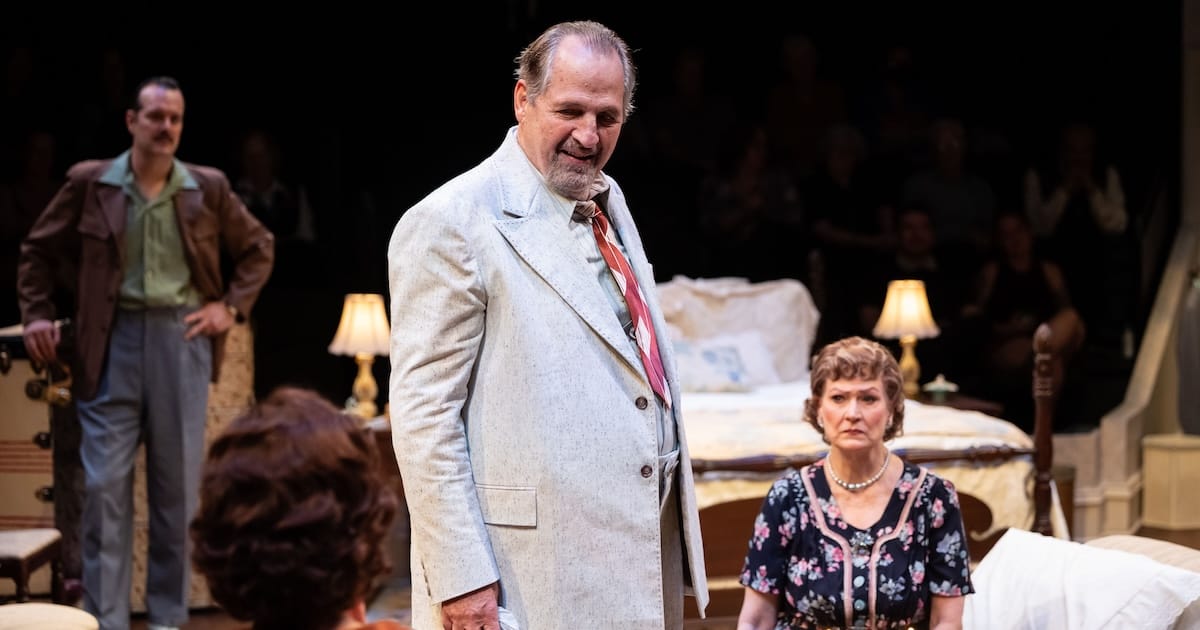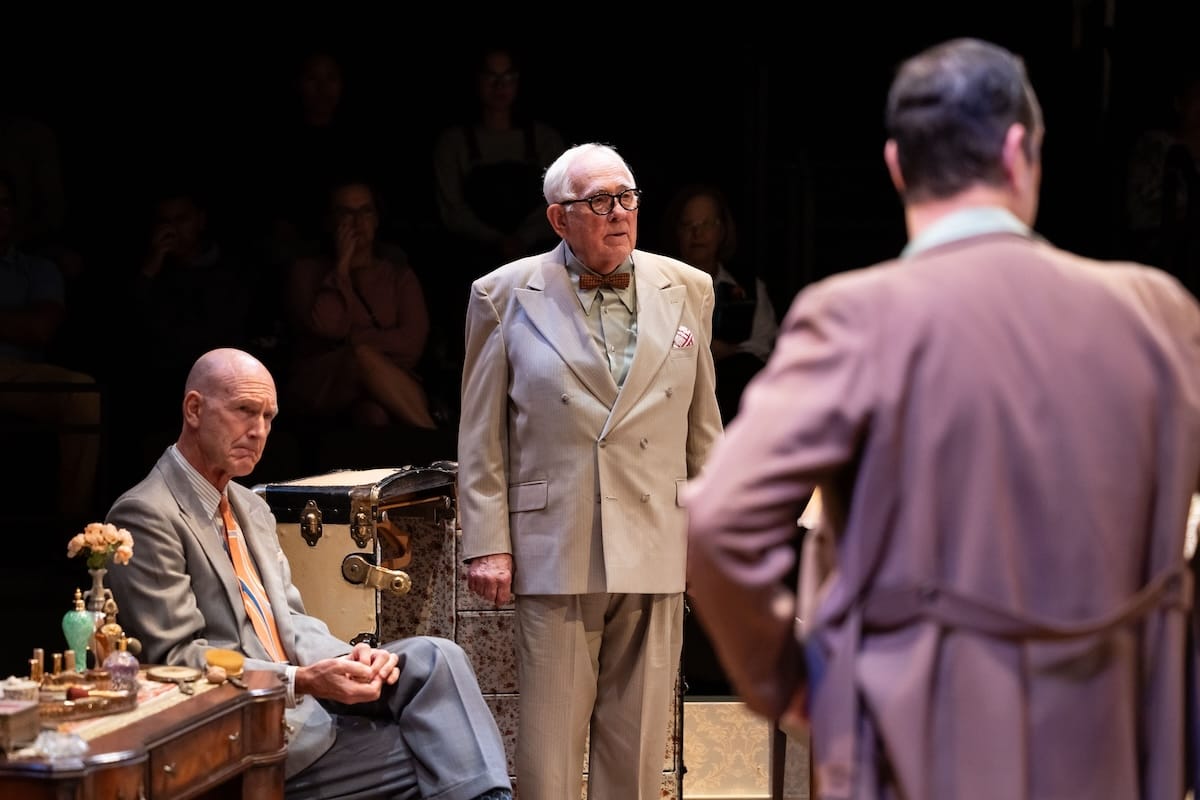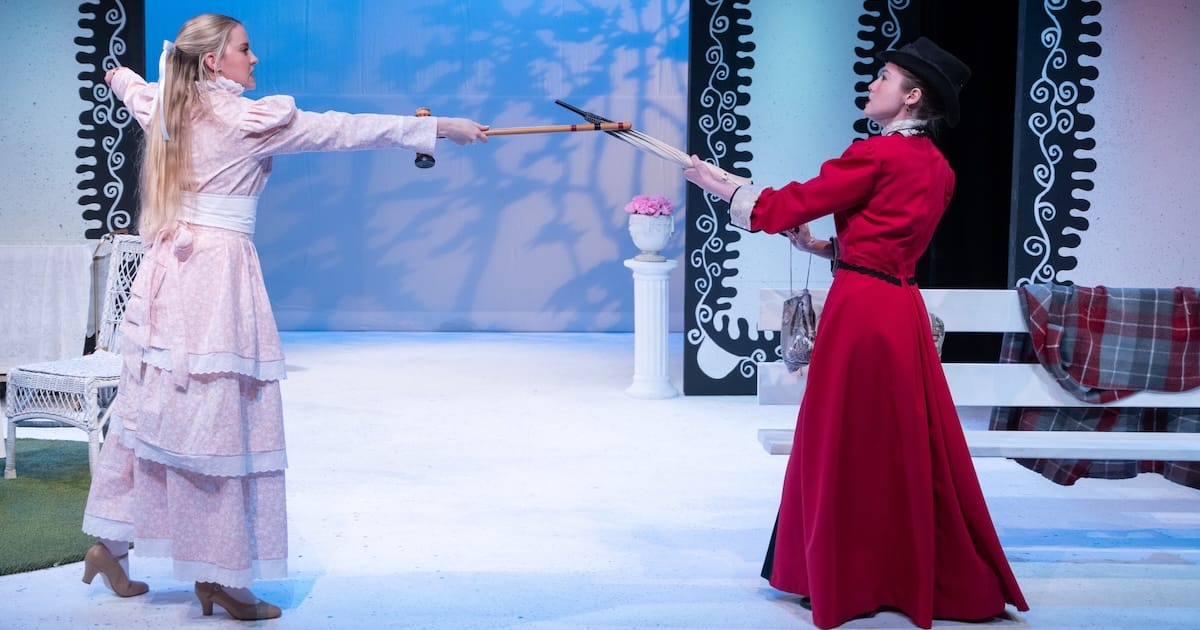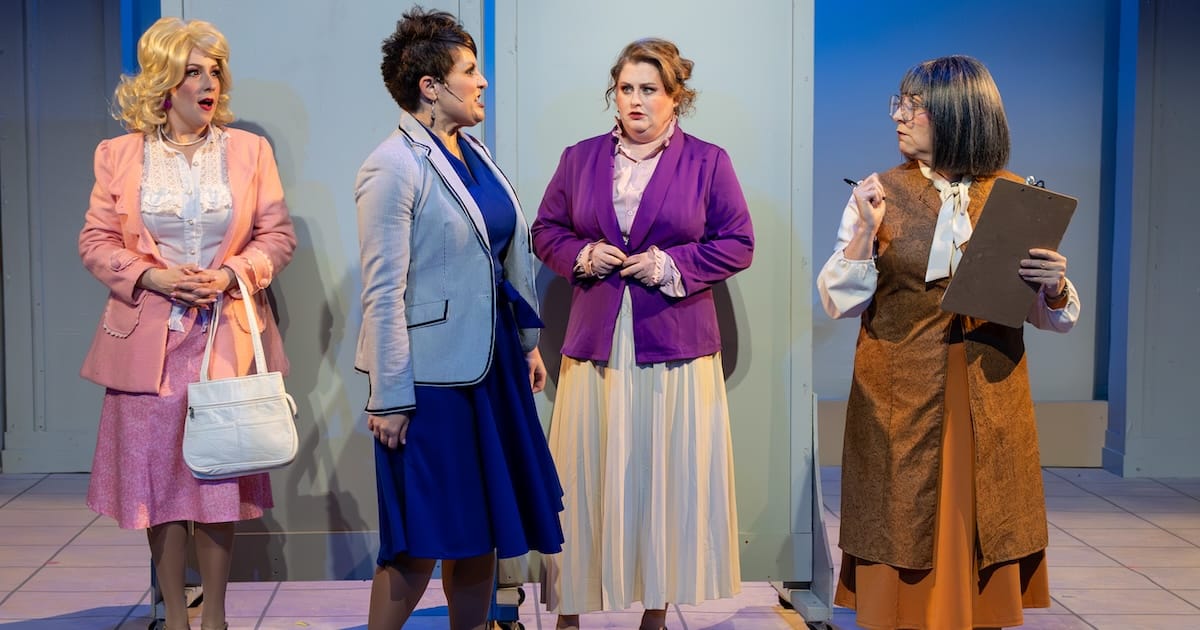Tennessee Williams’ Pulitzer-Prize winning play Cat On a Hot Tin Roof is the quintessential screwed-up family drama in American theatre. And while it dates to 1955, its central theme of mendacity and deceit makes it particularly poignant now in a country where truth has been rendered almost meaningless.
Denver Center Theatre Company Artistic Director Chris Coleman helms this production, set in the round in the Kilstrom theatre and featuring some notable Colorado actors. Playing Maggie (the “cat” in question) in her DCPA debut is Noelia Antweiler, who continues to impress as an actor with the range to nail roles from batty comedies to dark dramas like this one. Other locals on the stage include Jim Hunt as Reverend Tooker, Mark Rubald as Dr. Baugh, Lawrence Hecht as Big Daddy, Leslie Alexander as Big Mama and five local kids playing the children of Mae (Lenne Klingaman) and Gooper (Matthew Bryan Feld).
It’s a hot day in the Mississippi Delta, where the family is celebrating the birthday of cotton farmer Big Daddy. But the action in Act 1 is primarily between Maggie and her husband, Brick (Adam Hagenbuch) in their bedroom. From the get-go we see it as a failed marriage, with Brick utterly disinterested in anything Maggie says or does. He’s busy treating his grief over the suicide of his friend (and possible lover) Skipper with booze — guzzling whiskey until he feels a “click” that means he’s drunk enough not to give a damn about anything.
Meanwhile, we learn that Big Daddy is terminally ill with cancer — although the family tells him and Big Mama that his test results came back negative to spare the news until after the party. For Maggie and Brick’s sister Mae and her husband Gooper, the real news sets them racing to ensure they’ve got their cut of Big Daddy’s enormous estate.

Lawrence Hecht as Big Daddy and Leslie Alexander as Big Mama. | Photo: Jamie Kraus Photography
The family that hates together …
Williams’ script is an unsparing look at a family that’s grown to despise each other over the years. Brick’s contempt for Maggie is equaled by Big Daddy’s dismissive attitude toward Big Mama — although we don’t necessarily learn why. Mae loathes Maggie, flaunting her fertile loins (five kids and another on the way) and reveling in the open secret that childless Brick and Maggie no longer have sex.
As the cat on that hot roof not knowing whether to jump or continue suffering, Antweiler is at the top of her game. Backed into a corner with no support from anyone, she’s a pathetic figure still trying to remain relevant within the wealthy family she married into after a life of poverty. Antweiler does a lot of great acting with her face, and in Cat, the mismatch between her acid tongue and her almost panicked eyes is at the core of a fantastic performance. In Act 1, she speaks 10 words to Brick’s one, babbling at a pace that would send most other spouses jumping out the window.
But Brick copes by getting drunker and drunker while occasionally asking her, “Did you say something, Maggie?” following her diatribes. Hagenbuch is an excellent Brick, his chiseled body helping to illustrate his own sad history as a high school jock who’s never forgotten his glory days. To drive it home further, Williams has him limping about on a crutch for the entire play, a drunken injury from the night before trying to run hurdles as he once did.
Pressure cooker
It’s not unreasonable to consider a play like Cat on a Hot Tin Roof and wonder why anyone would want to watch such a train wreck of family drama. All families have secrets, unspoken grudges, resentments and other hangups. What’s so powerful about Williams’ script is the ripping away of any artifice masking such. In Cat, the Pollitt family has decades of junk blowing up over the course of a single day. Even without a true resolution, the story is jam-packed with dramatic potential, making it an exceptional showcase for acting talent and the direction behind it.
Coleman makes the most of what this cast has to bring, squeezing all the action into the one bedroom and letting them have it out. Along with the family, we also get nuanced performances from Mark Rubald as the doctor who ultimately has to break the bad news to Big Daddy. For a bit of levity, Jim Hunt does nice work as the ditzy reverend bumbling through the wreckage oblivious to what’s going on and serving as a punching bag for Big Daddy. Hunt’s final exit is a mini master class in comic timing — and we hate to see him leave as we’re then stuck with the rest of this gloomy gang.
As Big Daddy, Hecht is tremendous — a commanding figure tasked with having to portray his fading strength with his obvious weaknesses. Money and power surround him like a cloak, and watching how he’s treated by a family that mostly dislikes him is downright chilling. They can talk about how much they love him again and again, but in the end the buzzards are circling just waiting for him to kick it.
This DCPA Theatre Company show offers a powerful reminder that Williams’ examination of mendacity remains devastatingly relevant. With commanding performances and Coleman’s assured direction, this production strips away pretense to reveal uncomfortable truths about family, loyalty and self-deception. It’s not easy viewing, but it’s exceptional theatre that will leave you practically gasping for air.

Mark Rubald, Jim Hunt and Matthew Bryan Feld. | Photo: Jamie Kraus Photography
Alex Miller is editor and publisher of OnStage Colorado. He has a long background in journalism, including stints as the top editor at the Vail Daily, Summit Daily News, Summit County Journal, Vail Trail and others. He’s also been an actor, director, playwright, artistic director and theatre board member and has been covering theatre in Colorado since 1995.







Leave A Comment